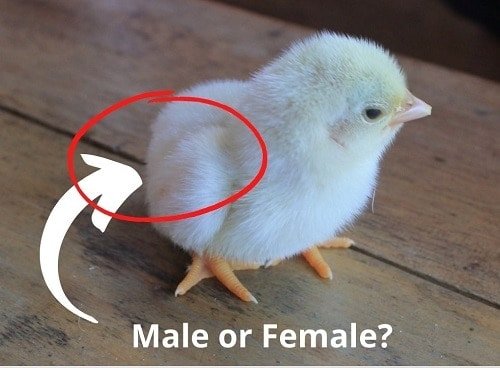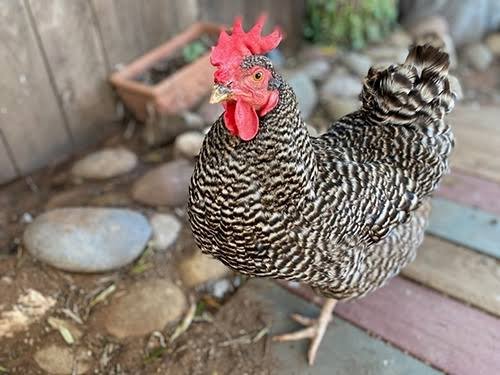10 Common Chicken Sounds and (How to Understand Them)

If you are interested in learning about most of the common chicken sounds that chickens make either as a chicken farmer or out of curiosity then this guide will be of help to you.
In this article, you will learn about most of the common sounds that a chicken makes and what it means.
You will learn about their distress call, food calls, danger cries, happy sound, rooster crows, chick sounds, and mating sounds.
In addition, you will get answers to most of the frequently asked questions about the most common chicken sounds.
So, if this is what you are looking for, continue reading till the end to get details about common chicken sounds.
Let’s get into details.
You may also like to read about Types of Chicken Poop: How to Identify Your Chicken Health From its Poop

10 most common chicken sounds you should know
Most of these chicken sounds are familiar to some of us but it’s more important if you intend to groom chickens in your backyard.
Also, if you intend to go into the chicken business, you will understand what each sound means in order to know when your chickens are in trouble.
So, below we will learn about the most common chicken sounds you will hear from your flock and what each sound means.
1. The Chicken Egg Laying Sound
This is perhaps the most common sound from a chicken, particularly the hen. Even if you do not own a chicken you must have heard it around your neighborhood.
It is a sound that a hen normally makes when she is about to lay an egg or in the process of laying one.
This sound is usually loud and consistent and might even get annoying when there is more than one hen that is about to lay an egg.
The chicken egg laying song is similar to the sound a hen makes when their favorite next is not available or occupied.
Her intention is to intimidate who or whatever is occupying her next to leave the next.
Although this rarely happens as she will move into another space close to that one while still complaining.
Check out this article about the 16 Myths About Fertilized Chicken Eggs That You Already Believed
2. Alarm of Danger Chicken Sound
The second most common chicken sound you will likely hear every now and again is the alarm cry.
This happens when there is a presence of an external trait or when an invasion is about to happen.
You may be familiar with this particular sound if you own a cat or a dog. That’s if you have been observant.
This alarm sound comes in two formats in order to notify the other chicken where the threat is coming from.
Ground Level Threat:
This sound is a fast-paced repetitive clucking that gets more louder and persistent as the danger approaches.
It’s usually when a snake, a cat, dog, or fox is about to intrude on the flock or prey on them.
While the second is the:
Air Raid Warning:
This sound is more like a repeated shriek which alerts the others that the danger is in the air.
The sound alerts them to take cover. As a result, you see the hen taking cover and calling for her chicks in order to cover them up.
And usually, this particular sound is majorly made by the rooster when a hawk is around.
But, when a rooster starts raising false alarms when there is no hawk in sight, the hens tend to ignore and rely on another member of the group to sound the alarm.
3. The Food Call Chicken Sound
This sound is another most common sound that is made among the chickens.
It’s a sound that is made either by the rooster alerting the other group of the presence of food or a hen making the food call to her chicks that food is available.
Hence, this sound is usually energetic like that of the alarm cry but in this case, they have found something that they love.
Observe this sound when you give them food or when food is made available to them.
4. Mother Hen Clucking Chicken Sound
This is another common sound that will sound familiar to you if you own a chicken.
After a hen lays her eggs, the next thing is for her to start sitting on the eggs, which leads her to start communicating with her unhatched chicks.
She begins to coo and murmur to them thereby creating that bond with them when they are still in the shell.
Shockingly, you might sometimes hear them peeping back to here in a form of response just before they hatch.
All of this is for the chicks to recognize her voice when they come out of the shell which eventually helps them understand what each sound means.
Now, when the chicks are finally out of their shell and start moving around with their mother, she begins to teach them the safety sounds and rules.
The mother hen has two well-defined sounds she makes to bring her chicks back to her when there is danger.
The first is a low-pitched clucking sound which the chicks identify as “stay close to mama”.
While the second is a high-pitched sound more like an alert sound especially when they are not close to her.
The chicks understand this as “run to mama!” Or “take cover wherever you are!”.
Since we are talking about brooding chickens here, you may also like to read about How to Make Simple DIY Chicken Nesting Boxes
5. Chick Sound
The young chick might not sound like the adult chicken but, they do have their own way of expressing how they feel either to their mother or you.
So, if you plan on taking them away from their mother, you will have to learn about their chirping sound for you to understand their needs.
Now, there are five well-defined sounds a chick can make
i. Happy mood:
Just like the adult a chick also has a way they show they are content and happy and it’s usually a soft and cheerful peep.
ii. Fear:
This particular sound that shows fear is usually a high-pitched and fast repetitive peep.
They usually make this sound when taken away from their mother but immediately after you drop them back to their mother they stop.
Interesting! Right?
iii. Distress:
This peeping sound is a higher-pitched sound that is also repetitive and they usually make this type of sound when they are hungry or too cold.
iv. Startled:
There is usually a case where other little chicks or siblings would engage each other now and then.
When another chick sneaks up on the other thereby pecking them, you’ll hear a high-pitched peep from the unaware chick.
v. Panic:
This sound is similar to that of the distress peep but more like a cry for help.
It’s usually when they are lost or can’t find their way home to their mother or there is a predator.
Chicks need a lot of care, so here is a detailed guide on How To Care For Day-Old Chicks.
6. Happy Murmuring sound
This is actually one of the most common chicken sounds you will always get to hear every now and then.
This sound is usually a low murmur which shows that your Chickens are happy and content.
It’s a peaceful sound that says they are safe and having a good time, especially those that are groomed as pets.
They tend to make a purr in contentment which is a sign that you are doing something right.
7. The Rooster Crowing Sound
The most recognizable chicken sound in the early morning crow by the rooster tells the break of a day.
Back in the olden days, this crow by the rooster was what people used in telling what time of the day it was.
Aside from that, this crow by the rooster can mean a lot of things to the rest of the flock.
It can mean:
- A show off to the other chickens
- It’s time to get up and hunt.
- The breeder is here with food
- Warning to challenging roosters
- The presence of a predator
- Warning to predators
- To express a need that must be met.
And the list goes on.
If you have a flock with more than one rooster the crow always comes in a particular order.
Whereby the first to crow is the head rooster then the others will follow in order of seniority and no one crows before him.
However, there have been cases where a hen crows but this is rare.
8. Mating Sound
Funny enough, this will be the most common chicken sound because it’s something everyone has seen on a regular basis.
This particular sound is usually made by the rooster which comes as a low, deep, and rumbling sound.
When the rooster is about to mate with a hen, there’s a sign he exhibits which is circling the hen and flicking his wings on the ground.
On the other hand, the hen won’t make any sound at all during this process.
Although, there are occasions when she lets out a sharp cry of a surprise if a rooster approaches her unaware.
After mating, comings egg laying, but the question is How Many Eggs Does A Chicken Lay In A Week?
9. Broody Hen Growl Sound
This sound is made by a hen that is protective of her eggs. They usually get bad-tempered and hormonal until their chicks hatch.
Whenever you try getting close to her, she makes a hissing and growling sound that states keep off!
Broody hens are the angriest birds you’ll ever meet, and it’s better to avoid them at all costs.
It is best to provide them with their own water and food so they don’t have to leave their eggs.
10. The Quiet Chicken Sound
As much as some birds might not be vocal as the rest, they will still talk. However, the shy ones will not talk much as those higher on the pecking other.
Now, it’s of importance to note that whenever a chatty chicken of yours is no longer talking, something is not right.
You should check them over to be sure they are okay and keep an eye just in case they are about to fall ill.
Although, there are cases where a chicken gets quiet as a result of depression due to the death of a fellow chicken.
Conclusion
Chickens make different types of sounds which are many that they can make to communicate with each other consistently.
They can crow, warble, make the peeping sound and even purr each of these sounds can either be distress, murmuring food call, or an alert sound.
It’s normal for your chicken to be noisy however, while some breeds are quieter than others, some can be quiet due to some reasons.
The best way for you to learn your chicken language is by spending time with them and with this, you will understand the common sounds that they make especially when they are in need of your help.
So if you haven’t gone over this article to learn about most of the common sounds that chickens make and their meaning.
Frequently Asked Questions
How do I learn what my chickens are saying?
Various breeds have different vocalization styles, but the basic sounds are all the same.
Observing your chickens and learning their language is the greatest approach to becoming familiar with them.
You’ll be able to figure out what each of their noises implies if you pay attention to how they communicate and interact with one another.Are certain chicken breeds louder than others?
Yes, there are some chicken breeds that are louder than others. For instance, Australorps and Barred Rocks are two silent breeds that don’t produce a lot of noise.
Then there are others like the Rhode Island Reds and Cornish, who can’t stop talking.Can a hen crow?
Only hens with a hormonal imbalance have been known to crow, which is extremely rare.
References
- Poultrycaresunday.com – What Sounds Do Chickens Make? (11 Common Sounds Of Chicken)
- Petkeen.com – 10 Common Chicken Sounds and Their Meanings (With Audio)





